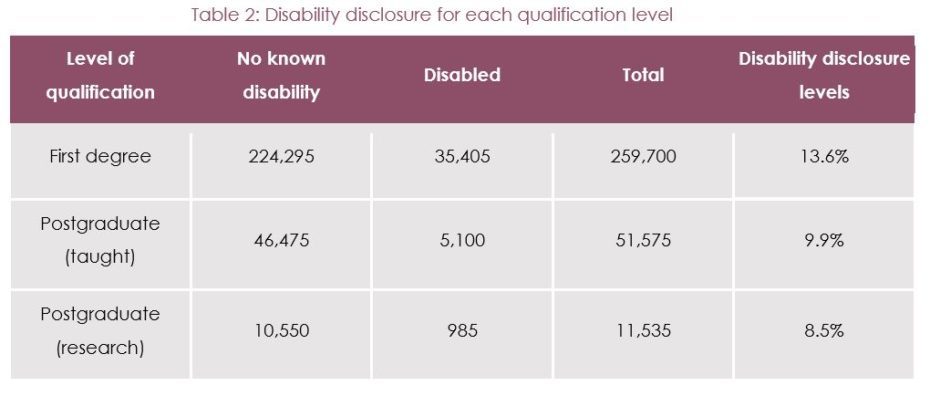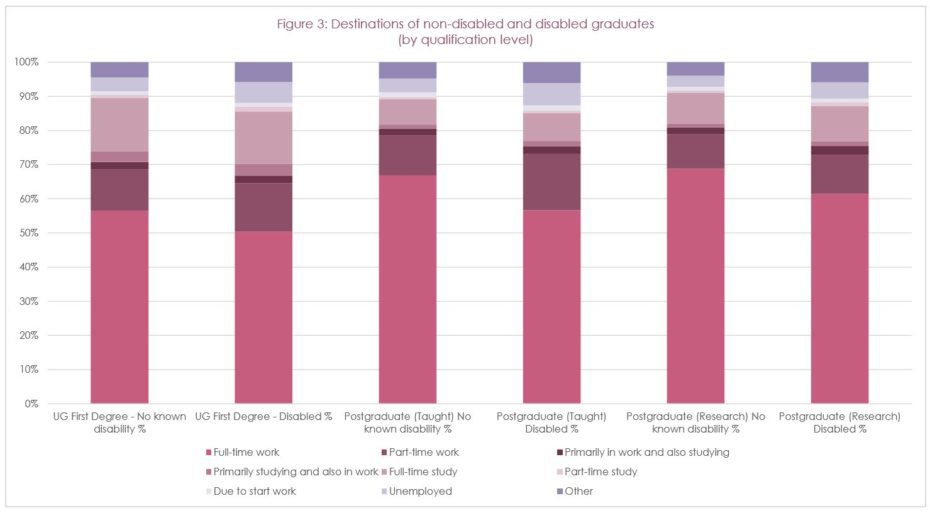For the past sixteen years, the Association of Graduate Careers Advisory Services (AGCAS) has commissioned the national AGCAS Disability Task group to carry out a study into the destinations of disabled graduates. This research has resulted in the annual What Happens Next? report which, over the years, has provided insights into the impact that a disability can have on a graduate’s prospects in the labour market.
This most recent What Happens Next? report again highlights the fact that there are notable differences in the outcomes of disabled and non-disabled graduates- and this employment disadvantage experienced by graduates with disabilities has clear links to social mobility. This represents an issue that should be tackled not only for moral purposes, but also for economic reasons: disabled graduates represent a talented group of individuals who have the potential to contribute to the UK economy and so be of benefit to all society.
Using data acquired by HEFCE for the DHLE survey carried out on individuals graduating in 2016 in the UK, this most recent study reports on the disclosure of disability and destinations of this cohort of graduates. There has been a year-on-year increase in the proportion of graduates disclosing a disability at all qualification levels for the past three years and this trend is in line with the increase in disabled students entering higher education in recent years. Continuing the pattern of the past two What Happens Next? reports, disclosure decreased with increasing qualification level.

Employment
So what are the key findings of this study? Firstly, compared to non-disabled graduates, at all qualification levels those disclosing a disability were less likely to be in full-time employment, more likely to be in part-time employment and more likely to pursue further study. These poorer progression rates into full-time employment for disabled graduates are a recurring theme in What Happens Next? reports. However, there was a general increase in total employment figures (full and part-time employment combined) for disabled graduates with increasing qualification level.

This study also explored the basis on which the graduates were employed. One interesting finding which concurs with the previous year’s report is that disabled graduates are generally more likely to self-employed or in the process of starting their own business. This finding is actually in agreement with UK statistics as a whole, where the proportion of individuals with disabilities in self-employment is higher than the proportion of disabled individuals in the employed workforce.
Another finding related to employment basis is that at both first degree and postgraduate (taught) levels, disabled graduates were less likely to be employed on a permanent contract. This trend, however, is not found at postgraduate (research) level, which could suggest that the heightened specialist knowledge gained through studying a PhD (or similar qualification) contributes to a ‘closing of the gap’ between disabled and non-disabled graduates.
Analysing disability type
In terms of disability type, graduates disclosing a Specific Learning Difficulty were most likely to have entered full-time employment and the least likely to be unemployed. Conversely, of all the disability groups, those with a social communication/Autistic Spectrum Disorder (ASD) condition were least likely to be in full-time employment and most likely to be unemployed. Indeed, for this group of graduates, unemployment figures actually increased with increasing qualification level.
Graduates (at all qualification levels) with an ASD condition who had obtained employment were less likely to have secured this on a permanent basis than any other disability group; this group also had the higher proportions employed on a voluntary basis. These findings are concerning and demonstrate the requirement for more to be done to provide much-needed support for this group of graduates.
A role to play
University careers services play a key role in recognising the needs of, and providing targeted, personalised support to, disadvantaged students and graduates to help them achieve the best possible career outcomes. But all of us- graduate employers, universities and wider society – have a role to play in equalizing access to all careers, employers and organsisations.
AGCAS’ What happens next? 2018 report is published here














Thank you for sharing these stats and your article. Do you have further figures related to subject domains? I am research engineering education and use of technology within it. My current project involved supporting SpLD and ASD students alongside Neurologically typical students in Engineering Education in an inclusive way when they are at University. What role do you see Universities and Employers can play in enhancing the training and job prospects of autistic students?
Important stats, thank you for reporting. Recognising this gap in support, my co-trustees and I have set up a new charity, Autism Forward which raises funds to allow autistic adults to access specialist mentoring services to help them find and maintain employment and encourages employers to employ more autistic people http://www.autismforward.org.uk